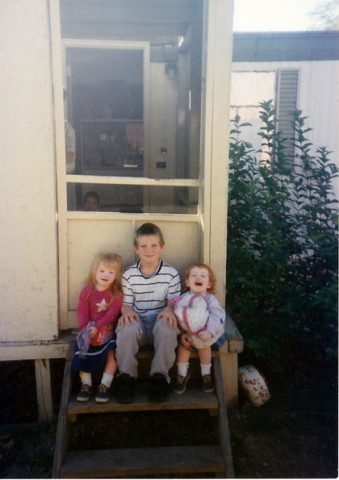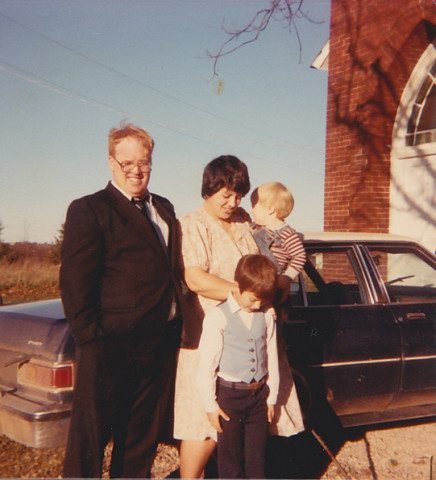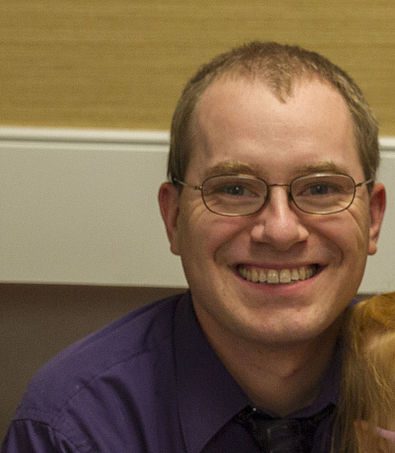
I live in rural northwest Ohio. I have spent most of my life living in rural communities. I am, in every way, a country boy; that is, in every way except my politics and religious beliefs. It is a well-known fact that it’s rural people who put Donald Trump in the White House and delivered solid Republican majorities to Congress and state legislatures. Here in Ohio, virtually every major state office is occupied by right-wing, pro-life, anti-same-sex-marriage, white Christians. Go to the major cities and college communities and you will find progressive/liberal/Democratic/socialist political beliefs. Drive ten miles outside of town, and everything quickly turns from red to blue. Here in Defiance County, almost three out of four voters vote Republican, and in the last presidential election, Donald Trump won by a sixty-four percent to twenty-nine percent margin. (Seventy-three percent of registered voters voted in the 2016 election.)
Religiously, Evangelical (and conservative Catholic/Lutheran/Methodist) Christianity rules the roost. In the four-county area where I live, there are roughly 140 thousand people and 400 Christian churches. Christian belief and practice colors every aspect of local life. It is assumed that everyone is Christian. Over the past decade, I have witnessed countless church-state violations. The Freedom From Religion Foundation (FFRF) could spend months here dealing with schools and other government agencies that don’t have a clue about the First Amendment, the establishment clause, or the separation of church and state. It’s not that local leaders deliberately set out to violate the law. It’s just that giving Christianity preferential treatment is very much part of the ebb and flow of life around here. It is just how it is.
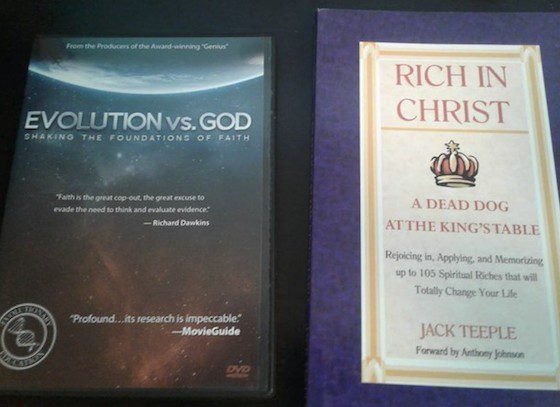
Let me give an example. Recently, nearby Hicksville High School gave its 2018 graduates bags of Evangelical literature and DVDs. Here’s what FFRF had to say on the matter:
A concerned student reported that during Hicksville High School’s commencement practice on May 30, a guidance counselor handed every graduating student a package that contained Christian materials. The package included a copy of “Evolution vs. God,” an anti-evolution film created by Christian evangelist Ray Comfort, “Rich in Christ: A Dead Dog at the King’s Table,” a religious tract titled “Are you a Good Person,” and a religious pamphlet that “explains the plan of salvation in easy-to-understand terms” called “Life’s Most Important Question.” FFRF’s complainant reports that this package was put together by a science teacher at the school.
This package included a letter titled “Hicksville High School Class of 2018,” which reads:
Congratulations 2018 Graduate!
As you look ahead to your future with excitement and great anticipation, may you also come to discover God’s very best for your life. God loves you so very much that He sent His Son Jesus to earth to die for your sins so that you may have a personal relationship with God, and be assured of an eternal home in Heaven.
Rich in Christ is filled with hope and encouragement for you. It contains dozens of wonderful promises from the Bible, that God wants you to understand and claim as your very own. May you find God’s richest blessings as you follow His leading and His blueprint for true success. Enjoy your riches!
“For you know the grace of our Lord Jesus Christ, that though he was rich, yet for your sakes he became poor, so that you through his poverty might become rich.” II Corinthians 8:9
The letter indicates that a number of local individuals and businesses, including Hicksville Exempted Village School Superintendent Keith Countryman and his wife, sponsored the gift package.
“It is a fundamental principle of Establishment Clause jurisprudence that a public school may not advance, prefer, or promote religion,” FFRF Legal Fellow Chris Line writes to Countryman. “As a public school, Hicksville High School cannot promote Christian religious doctrine by distributing proselytizing materials to students as part of graduation rehearsal, a school function. This violates the principle that ‘the preservation and transmission of religious beliefs and worship is a responsibility and a choice committed to the private sphere,’” to quote the U.S. Supreme Court.
The school district has an obligation under the law to make certain that “subsidized teachers do not inculcate religion,” to again quote the U.S. Supreme Court. When faculty use school time to proselytize to students, whether it be through distribution of literature or through religious statements, they are taking religion out of the private sphere and violating parental trust.
Religion is a divisive force in public schools, FFRF emphasizes. When a school distributes sectarian religious literature to its students it entangles itself with those religious messages. As well as alienating non-Christian students, teachers, and members of the public whose religious beliefs are inconsistent with the message being promoted by the school, these practices estrange the 24 percent of Americans, including 38 percent of young adults, who identify as nonreligious. prri.org/wp-content/uploads/2017/09/PRRI-Religion-Report.pdf
“It is a violation of the duties and responsibilities of public school staff to proselytize students,” says FFRF Co-President Annie Laurie Gaylor. “Imagine the uproar if a staff member was propagating atheism or Islam.”
Gaylor calls the school officials’ actions “bizarre,” saying that it is particularly concerning that a science teacher had a hand in distributing anti-evolution propaganda to graduating seniors and that the superintendent sponsored the unconstitutional distribution.
FFRF insists that to avoid constitutional violations, any future graduation “gifts” distributed by Hicksville Exempted Village School staff as part of a school function not contain religious materials.
The Freedom From Religion Foundation is a national nonprofit organization with 33,000 members and several chapters across the country, including more than 800 members and a chapter in Ohio. Its purposes are to protect the constitutional principle of separation between state and church, and to educate the public on matters relating to nontheism.
According to the latest issue of Freethought Today, the Hicksville school district agreed to stop distributing sectarian religious materials to its students. Did the school administrators deliberately ignore the law, choosing, instead, to evangelistically promote Christianity? Of course not. They just did what has always been done. It is assumed that everyone is Christian.
I am an atheist and a humanist. I am a political liberal who aligns himself with the Democratic Socialist party. I generally vote Democratic, but many local Democrats, thanks to their religious beliefs, skew to the right. This is especially true for those who are forty-five and older. Even local mainline Christian churches — which are historically liberal — tend to be conservative politically and socially. True liberals such as myself are as rare the ivory-billed woodpecker. We exist, but there aren’t many of us. We tend to lurk in the shadows, pining for the day when progressive values prevail. The good news is that younger locals are far more liberal than their parents and grandparents. I see a better day ahead, but in the short-term, people such as myself must bite our lips, hold our tongues, and silently swear.
Last month, Polly and I attended a tractor pull at the Fulton County fairgrounds. The event was sponsored by the National Tractor Pullers Association. Events such as this one are gaudy displays of American exceptionalism, nationalism, and conservative Christianity. Imagine sitting through nine minutes of masturbation to the Christian God and the American flag. First, the crowd was asked to stand and recite the Pledge of Allegiance. Second, the PA announcer read a four-minute monologue set to music about the greatness of America and its military, reminding everyone that REAL PATRIOTS stand and honor the flag. Then it was time to sing the Star Spangled Banner. And last, but not least, the preacher/announcer prayed a sectarian prayer in the name of Jesus, amen.
By the time all this nonsense was over, I was ready to scream. My son asked me, Dad, why do you subject yourself to this stuff? I replied, because I love watching tractor pulls. I endure the religious/nationalist nonsense because I know what waits on the other side of the Amen.
I willingly choose to live in rural Northwest Ohio. Twelve years ago, Polly and I returned to this part of the state so we could be close to our children and grandchildren. We do not regret doing so. We love the slowness of small town life, and when we want to experience big city life, Toledo and Fort Wayne are but an hour away. Applebee’s is considered “fine” dining around here. When we want to enjoy a meal at an upscale restaurant, we drive to Fort Wayne or Findlay. In every way, we have a good life. That said, choosing to live in a place where Jesus and the GOP are joined at the hip requires us to practice the fine art of compartmentalization.
I own a photography business: Defiance County Photo. I shoot many of the local high school’s sporting events. I don’t advertise my politics or lack of religious beliefs. It is hard enough to make a few meager bucks off my photography work without limiting my business opportunities by being an in-your-face atheist and socialist. I don’t hide my beliefs, but I don’t talk about them either. Recently, I had a job interview where the business owner tried three times to goad me into a religious discussion. He really, really, really wanted to share his “testimony” with me, but every time he mentioned God/Jesus/faith, I said nothing. That was my way of telling him, I AIN’T INTERESTED! Polly has a similar problem at work. She’s a pro at ignoring attempts to drag her into discussions about this or that Christian belief.
I have one compartment that contains my business. I am sure some locals know I am an unbeliever and a political liberal. I suspect these facts cost me business. As an atheist, I want to live and conduct my business in such a way that Christians around me will be perplexed by my good works. I know doing so confuses some of them, as they have been told by their preachers that atheists are Satan worshipers, baby killers, and lovers of sin. Much like Jesus commands Christians to live, I want people to see that you can live a good, meaningful life without God or the Bible. I want to “let my little light shine!”
I have another compartment that contains Bruce Gerencser, the father and grandfather. I attend a number of school events every year. Ten of our twelve grandchildren attend three different local school districts. Many of them play summer sports, and several of them play junior high and high school sports. I always have my camera with me, shooting this or that event or game. Thanks to my white beard, ruddy complexion, and portly build, I look like Santa Claus. The school mates of my younger grandchildren wonder if I am the “real” Santa. Of course I am! I enjoy playing the role.
In this compartment, it’s all about family. I don’t talk about politics or religion. When people extol the virtues of the Tyrant King, I outwardly smile and say nothing. Why? I don’t want my politics or godlessness to negatively affect my grandchildren. Believe me, I would love to be a fire-breathing atheist. I would love to eviscerate those who blindly and ignorantly support our Toddler-in-chief. However, for the sake of my family, I say nothing.
Finally, I have a compartment where I am a vocal, outspoken atheist, humanist, and Democratic socialist. This blog is home to my writings on religion and politics. Few locals read my writing, though I suspect more than a few have done a Google search on my name and have come across this blog. I make no apologies for the subject matter of my writing. It is here that I can be open and honest. If locals stumble across this site and are offended, that’s their problem. This is my “ministry,” so to speak. The Bible spoke of Jesus not being able to do mighty works among his own people because of their unbelief. I understand Jesus’ plight; the difference being, of course, that I can’t do many mighty works among my own people because of their religious and political beliefs. I am, in every way, a stranger in a land I dearly love. That’s not to say that there are not other atheists or socialists around here. There are, but due to family and employment concerns, they, too, keep a low profile. From time to time I will receive emails from local heathens thanking me for my writing. They often say they wish they could be an out-of-the-closet atheist such as myself. Fear keeps them in the closet. Maybe someday we will be more in number, but for now, we choose to keep our heads down, knowing that being a vocal atheist would be social and career suicide. It’s not fair, but I learned long ago that little in life is.
Do you live in rural America? Please share your experiences in the comment section. Are you forced to compartmentalize your life? How do you balance your unbelief with societal and familial norms?
About Bruce Gerencser
Bruce Gerencser, 61, lives in rural Northwest Ohio with his wife of 40 years. He and his wife have six grown children and twelve grandchildren. Bruce pastored Evangelical churches for twenty-five years in Ohio, Texas, and Michigan. Bruce left the ministry in 2005, and in 2008 he left Christianity. Bruce is now a humanist and an atheist. For more information about Bruce, please read the About page.
Bruce is a local photography business owner, operating Defiance County Photo out of his home. If you live in Northwest Ohio and would like to hire Bruce, please email him.
Thank you for reading this post. Please share your thoughts in the comment section. If you are a first-time commenter, please read the commenting policy before wowing readers with your words. All first-time comments are moderated. If you would like to contact Bruce directly, please use the contact form to do so.
Donations are always appreciated. Donations on a monthly basis can be made through Patreon. One-time donations can be made through PayPal.


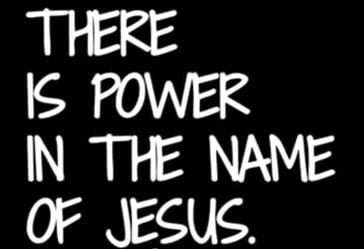 There is power in the name of Jesus. Or so Evangelicals believe, anyway. I have spoken the name of Jesus tens of thousands of times, both as a Christian and an atheist, yet I have found Jesus’ name to be impotent and powerless. As a Christian, I ended every prayer with in Jesus’ name, amen. I invoked the name of Jesus countless times in my sermons, in my writing, and in my day-to-day conversations. Yet, despite my devotion to Christian faith and practice, I found Jesus’ name to be every bit as powerless as the names Tom, Dick, and Harry. As an atheist, I have written and spoken the name of Jesus thousands of times, often in blasphemous ways. Yet, the name of Jesus remains powerless. Surely, my irreverence and blasphemy are an affront to Jesus, yet he does nothing. Wouldn’t it be a great way to make a point to other blasphemers if Jesus struck dead the infamous Evangelical-preacher-turned-atheist Bruce Gerencser? Well you just wait, Bruce, your payday is coming, Evangelicals say. In an hour that you think not, Jesus — the giver and taker of life — is going to call your number and cast you into the Lake of Fire. Then you will know the power that is in the name of Jesus.
There is power in the name of Jesus. Or so Evangelicals believe, anyway. I have spoken the name of Jesus tens of thousands of times, both as a Christian and an atheist, yet I have found Jesus’ name to be impotent and powerless. As a Christian, I ended every prayer with in Jesus’ name, amen. I invoked the name of Jesus countless times in my sermons, in my writing, and in my day-to-day conversations. Yet, despite my devotion to Christian faith and practice, I found Jesus’ name to be every bit as powerless as the names Tom, Dick, and Harry. As an atheist, I have written and spoken the name of Jesus thousands of times, often in blasphemous ways. Yet, the name of Jesus remains powerless. Surely, my irreverence and blasphemy are an affront to Jesus, yet he does nothing. Wouldn’t it be a great way to make a point to other blasphemers if Jesus struck dead the infamous Evangelical-preacher-turned-atheist Bruce Gerencser? Well you just wait, Bruce, your payday is coming, Evangelicals say. In an hour that you think not, Jesus — the giver and taker of life — is going to call your number and cast you into the Lake of Fire. Then you will know the power that is in the name of Jesus.


